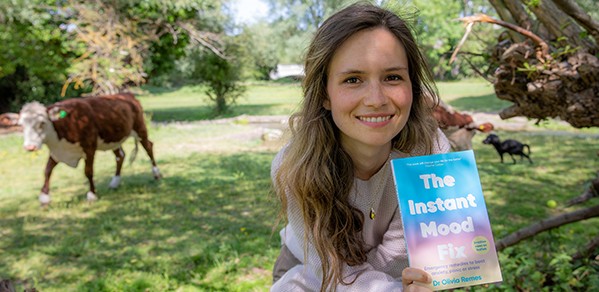
Mental health researcher Dr Olivia Remes has made the transition to the Department of Engineering in a role looking at depression in young people. Here she explains how the adoption of engineering methods can help identify and prioritise interventions in the treatment of depression.
Through my own pursuit of the science of wellbeing, I have developed a system of coping strategies that help people thrive and flourish, attain mental wellbeing, and overcome setbacks in life.
Dr Olivia Remes
I have focused on anxiety, depression, wellbeing and resilience for almost a decade through my research at the University of Cambridge. My PhD in Public Health and Primary Care, based on data from more than 30,000 people, focused on what makes people anxious and depressed, as well as coping strategies that protect against poor mental health.
I have joined the Department of Engineering from Cambridge Public Health, where I examined the risk factors of anxiety and depression, focusing on the incidence of these conditions at a societal level. I am now a Research Associate at the Institute for Manufacturing (IfM), working with Peter Templeton, leader of IfM Engage's healthcare innovation work and founder of a charity focusing on innovations for young people's mental health, and the Aviva Foundation, on research looking at bringing stakeholders from different sectors (e.g. academia, industry, healthcare, charity) together, to identify new ways of preventing and treating depression.
What would you say if I told you that we could prevent people from becoming depressed? This is where engineering methods can help. It is a novel concept – the application of engineering methods to mental health – and accelerating the rate of progress in helping us to identify what leads to depression, and therefore, how to identify those who are high risk. Once we identify vulnerable individuals, they can be targeted with interventions or prevention programmes.
Wellbeing and prevention are key aspects of this project, namely how to increase resilience in those with depression, as well as in young people, so that they are protected from poor mental health. Many people with depression can experience relapses and a number of people do not experience improvement in symptoms. Through workshops, analysis, and stakeholder consultations, we are identifying and bringing forward recent, effective innovations focused on depression. Our secondary aim is to enable the joining up of sectors to advance mental health care, and through our collaborations, we have formed a Community of Interest of stakeholders from the public and private sectors.
My work and expertise also extends to mental health in the workplace: recognising the signs of anxiety and stress, depression and burnout, and factors related to resilience at work. An area I have written about relates to mental health and hybrid work – this is a topic which is currently of concern, as employers are looking at new ways of working and the future of work.
Through my own pursuit of the science of wellbeing, I have developed a system of coping strategies that help people thrive and flourish, attain mental wellbeing, and overcome setbacks in life. Further to this, I have delivered seminars and webinars on mental wellbeing to staff and students at the University of Cambridge and other organisations, helping people learn how to thrive in spite of adversity and change. All of this work is now available to read in my book titled The Instant Mood Fix. Based on science and containing real life stories, I reveal 50 strategies for becoming optimistic, decisive, resilient, and letting go of fears, anxiety, and other mindsets or patterns that are holding us back.

